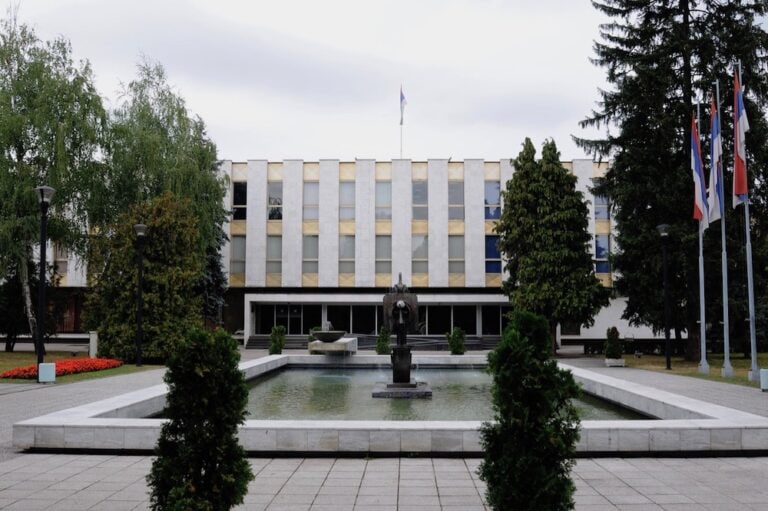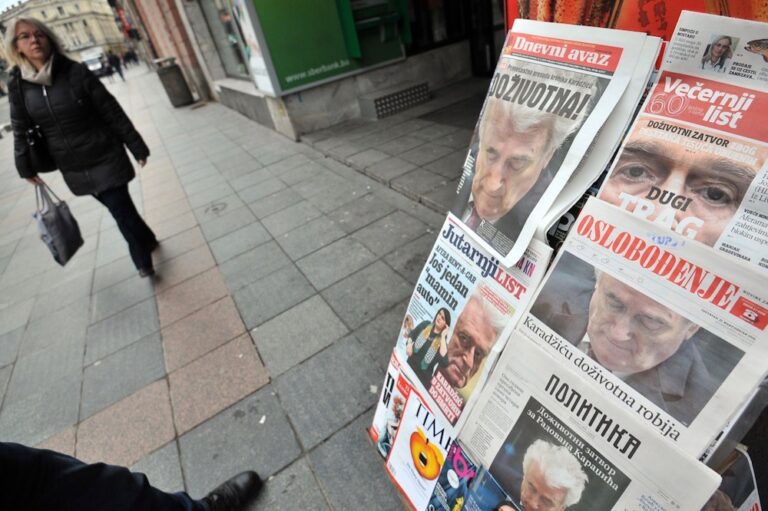On 28 June 1995, a 550-pound bomb carried by what United Nations (UN) officials described as a makeshift rocket crashed into the television building in Sarajevo, killing a police guard and wounding 38 civilians, among them Bosnian and foreign journalists. The television tower which houses Bosnian and foreign television companies has often been hit during […]
On 28 June 1995, a 550-pound bomb carried by what United Nations
(UN) officials described as a makeshift rocket crashed into the
television building in Sarajevo, killing a police guard and
wounding 38 civilians, among them Bosnian and foreign
journalists. The television tower which houses Bosnian and
foreign television companies has often been hit during the 39
month siege of Sarajevo, but used to offer good protection
against artillery fire.
Three Bosnians working for Associated Press Television (AP TV),
Eldar Emric, Asja Resavac and Mirsad Helac, were injured but are
in stable condition. Dave Albritton, an American staffer with
Cable News Network (CNN) cut by flying glass, was carried out on
a stretcher stained with blood. Doctors at the United Nations
(UN) medical centre said they expected him to recover.
The second floor offices of WTN, APTV and the European
Broadcasting Union were completely destroyed. Rubble, ceiling
beams, scattered video tapes and tons of shattered glass littered
the building. The CNN office, across the corridor from WTN, was
also damaged, but the crew managed to broadcast live, shortly
after the event.
“The devastation of the television building has reminded us once
again of the hazardous working conditions of journalists
reporting the war in former Yugoslavia,” said Aidan White,
General Secretary of the International Federation of Journalists
(IFJ). “Especially our Bosnian colleagues, whose lives have been
threatened by sniper fire and mortar bombs for more than three
years, need our solidarity and assistance.”
Through its Safety Fund and the Emergency Assistance Fund
administered by the IFJ/FIEJ co-ordinating centre in Ljubljana,
Slovenia, the IFJ has provided humanitarian assistance for
journalists and has helped independent media in former
Yugoslavia. Members of the Republic of Bosnia-Herzegovina
Journalists’ Union and the Independent Union of Professional
Journalists, the IFJ’s member organizations in Bosnia, are among
those wounded in the bombing. The IFJ has appealed to its member
organizations to provide assistance to the journalists who have
been wounded in the attack.
Recommended Action
Send appeals to Bosnian Serb authorities:
in Sarajevo was an intentional attack on freedom of expression
their attacks on journalists in Sarajevo
Appeals To
Dr. Radovan Karadzic
President, Republika Srpska
(Leader of the Bosnian Serbs)
Pale, Bosnia-Herzegovina
Fax: +387 71 783 566 or +387 71 783 324
Please copy appeals to the originator if possible.
For further information on the Safety Fund and the Emergency
Assistance Fund, contact the IFJ/FIEJ co-ordinating centre for
Independent Media in the Balkan Region, tel: +386 61 132 70 34;
or IFJ, Rue Royale, 266, B-1210 Brussels, Belgium, tel:+322 223
2265, fax:+322 219 2976, e-mail: ifjsafenet@gn.apc.org


